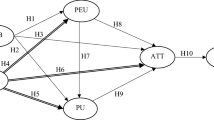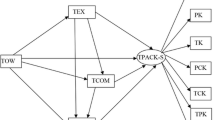Abstract
With the rapid developments in technology, training of pre-service teachers in terms of technology integration has become a crucial issue for all stakeholders of education. However, it is important to investigate the relationships among pre-service teachers’ teaching beliefs, skills, and educational technology integration competencies before training pre-service teachers of all fields. Within the scope of this objective, a model was proposed to investigate the relations among pre-service teachers’ epistemological beliefs, conceptions of teaching and learning (COTL), and educational technology integration competencies. As for the participants, 1499 pre-service teachers enrolled at the School of Education at Northwestern region of Turkey participated in the study. An Educational Technology Integration Competencies Scale, Epistemological Beliefs Scale, and COTL Scale, which were developed by the researchers, were utilized to collect the data. At the end of the study, it was found that there were significant relations between pre-service teachers’ beliefs (epistemological beliefs and COTL) and their educational technology integration competencies, which is parallel with the findings of the studies in the literature.


Similar content being viewed by others
References
Ananiadou, K., & Claro, M. (2009). 21st century skills and competences for new millennium learners in OECD countries. Organisation for Economic Cooperation and Development. EDU Working paper no. 41. Retrieved June 8, 2018, from http://www.oecd.org/officialdocuments/publicdisplaydocumentpdf/?cote=EDU/WKP(2009)20&docLanguage=En.
Ayad, F. I., & Ajrami, S. J. (2017). The degree of implementing ISTE standards in technical education colleges of Palestine. TOJET: The Turkish Online Journal of Educational Technology, 16(2), 107–118.
Aydin, M. K., Gürol, M., & Vanderlinde, R. (2016). Evaluating ICT integration in Turkish K-12 schools through teachers’ views. Eurasia Journal of Mathematics, Science & Technology Education, 12(4), 747–766. https://doi.org/10.12973/eurasia.2016.1227a.
Bahcivan, E. (2014). Examining relationships among Turkish preservice science teachers’ conceptions of teaching and learning, scientific epistemological beliefs and science teaching efficacy beliefs. Journal of Baltic Science Education, 13(6), 870–882.
Bahcivan, E., & Cobern, W. W. (2016). Investigating coherence among Turkish elementary science teachers’ teaching belief systems, pedagogical content knowledge and practice. Australian Journal of Teacher Education, 41(10), 62–86.
Banister, S., & Reinhart, R. V. (2012). Assessing NETS•T performance in teacher candidates: exploring the wayfind teacher assessment. Journal of Digital Learning in Teacher Education, 29(2), 59–65.
Barron, A. E., Kemker, K., Harmes, C., & Kalaydjian, K. (2003). Large-scale research study on technology in K–12 schools. Journal of Research on Technology in Education, 35(4), 489–507. https://doi.org/10.1080/15391523.2003.10782398.
Bowes, K., D'Onofrio, A., & Marker, E. (2006). Assessing technology integration: Its validity and value for classroom practice and teacher accountability. Australasian Journal of Educational Technology, 22(4). https://doi.org/10.14742/ajet.1279.
Brownlee, J., Boulton-Lewis, G., & Purdie, N. (2002). Core beliefs about knowing and peripheral beliefs about learning: developing an holistic conceptualisation of epistemological beliefs. Australian Journal of Educational & Developmental Psychology, 2, 1–16.
Buehl, M. M., Alexander, P. A., & Murphy, P. K. (2002). Beliefs about schooled knowledge: domain specific or domain general? Contemporary Educational Psychology, 27(3), 415–449.
Chan, K. W., & Elliott, R. G. (2004). Relational analysis of personal epistemology and conceptions about teaching and learning. Teaching and Teacher Education, 20(8), 817–831.
Conley, A. M., Pintrich, P. R., Vekiri, L., & Harrison, D. (2004). Changes in epistemological beliefs in elementary science students. Contemporary Educational Psychology, 29(2), 186–204.
Elby, A., & Hammer, D. (2001). On the substance of a sophisticated epistemology. Issues and Trends, 85, 554–567.
Eren, A. (2009). Examining the teacher efficacy and achievement goals as predictors of Turkish student teachers’ conceptions about teaching and learning. Australian Journal of Teacher Education, 34(1), 69–87. https://doi.org/10.14221/ajte.2009v34n1.6.
Ertmer, P. A. (1999). Addressing first- and second-order barriers to change: strategies for technology integration. Educational Technology Research and Development, 47(4), 47–61.
Ertmer, P. A. (2005). Teacher pedagogical beliefs: the final frontier in our quest for technology integration? Educational Technology Research and Development, 53(4), 25–39.
Ertmer, P. A., Ottenbreit-Leftwich, A. T., & York, C. (2007). Exemplary technology using teachers: perceptions of factors influencing success. Journal of Computing in Teacher Education, 23(2), 55–61.
Fishbein, M., & Ajzen, I. (1975). Belief, attitude, intention, and behavior: An introduction to theory and research. Reading: Addison-Wesley.
Fives, H., & Buehl, M. M. (2012). Spring cleaning for the “messy” construct of teachers’ beliefs: What are they? Which have been examined? What can they tell us? In K. R. Harris, S. Graham, T. Urdan, S. Graham, J. M. Royer, & M. Zeidner (Eds.), APA educational psychology handbook: Individual differences and cultural and contextual factors (pp. 471–499). Washington, DC: American Psychological Association.
Fraenkel, J. R., & Wallen, N. E. (2009). How to design and evaluate research in education. McGraw-Hill, Inc..
Güneş, E., & Bahçivan, E. (2018). A mixed research-based model for pre-service science teachers’ digital literacy: Responses to “which beliefs” and “how and why they interact” questions. Computers & Education, 118, 96–106.
Han, I., Shin, W. S., & Ko, Y. (2017). The effect of student teaching experience and teacher beliefs on pre-service teachers’ self-efficacy and intention to use technology in teaching. Teachers and Teaching, 23(7), 829–842. https://doi.org/10.1080/13540602.2017.1322057.
Hernandez-Ramos, P. (2005). If not here, where? Understanding teachers’ use of technology in Silicon Valley schools. Journal of Research on Technology in Education, 38(1), 39–64.
Hew, K. F., & Brush, T. (2007). Integrating technology into K-12 teaching and learning: current knowledge gaps and recommendations for future research. Educational Technology Research and Development, 55(3), 223–252.
Hofer, B. K., & Pintrich, P. R. (1997). The development of epistemological theories: beliefs about knowledge and knowing and their relation to learning. Review of Educational Research, 67(1), 88–140.
Hsu, P. S. (2013). Examining changes of pre-service teachers’ beliefs about technology integration during student teaching. Journal of Technology and Teacher Education, 21, 27–48.
International Society for Technology in Education. (2014). ISTE Standards Teachers. Retrieved June 5, 2018, from http://www.iste.org/docs/pdfs/20-14_ISTE_Standards-T_PDF.pdf.
International Society for Technology in Education. (2017). ISTE Standards. Retrieved May 5, 2018, from https://www.iste.org/standards
Kane, R., Sandretto, S., & Heath, C. (2002). Telling half the story: a critical review of research on the teaching beliefs and practices of university academics. Review of Educational Research, 72(2), 177–228.
Kim, C., Kim, M. K., Lee, C., Spector, J. M., & DeMeester, K. (2013). Teacher beliefs and technology integration. Teaching and Teacher Education, 29, 76–85.
King, P. M., & Kitchener, K. S. (2004). Reflective judgment: theory and research on the development of epistemic assumptions through adulthood. Educational Psychologist, 39(1), 5–18.
Koballa, T. R., Graber, W., Coleman, D. C., & Kemp, A. C. (2000). Prospective gymnasium teachers’ conceptions of chemistry learning and teaching. International Journal of Science Education, 22(2), 209–224.
Koballa, T. R., Glynn, S. M., Upson, L., & Coleman, D. C. (2005). Conceptions of teaching science held by novice teachers in an alternative certification program. Journal of Science Teacher Education, 16(4), 287–308.
Liu, S. H. (2011). Factors related to pedagogical beliefs of teachers and technology integration. Computers & Education, 56(4), 1012–1022.
Liu, S.-H. (2012). A multivariate model of factors influencing technology use by pre-service teachers during practice teaching. Educational Technology & Society, 15, 137–149.
Martin, W., & Shulman, S. (2006). Intel teach essentials instructional practices and classroom use of technology survey report. Retrieved from https://files.eric.ed.gov/fulltext/ED494013.pdf.
Marton, F., Dall’Alba, G., & Beaty, E. (1993). Conceptions of learning. International Journal of Educational Research, 19(3), 277–299.
Mishra, P., & Koehler, M. J. (2006). Technological pedagogical content knowledge: a framework for integrating technology in teacher knowledge. Teachers College Record, 108(6), 1017–1054.
Morphew, V. N. (2012). A constructivist approach to the national educational technology standards for teachers. Eugene: International Society for Technology in Education.
Pajares, M. F. (1992). Teachers’ beliefs and educational research: cleaning up a messy construct. Review of Educational Research, 62(3), 307–332.
Perry, W. G. (1970). Forms of intellectual and ethical development in the college years: A scheme. New York: Holt, Rinehart, and Winston.
Rokeach, M. (1968). Beliefs, attitudes, and values. San Francisco: Jossey-Bass Inc.
Saljö, R. (1979). Learning in the learner’s perspective: Some commonsense conceptions. Gothenburg: Institute of Education, University of Gothenburg.
Sang, G., Valcke, M., van Braak, J., & Tondeur, J. (2010). Student teachers’ thinking processes and ICT integration: predictors of prospective teaching behaviors with educational technology. Computers & Education, 54(1), 103–112.
Schommer, M. (1990). Effects of beliefs about the nature of knowledge on comprehension. Journal of Educational Psychology, 82(3), 498–504.
Schommer, M. (1994). An emerging conceptualization of epistemological beliefs and their role in learning. In R. Garner & P. Alexander (Eds.), Beliefs about text and about text instruction (pp. 25–39). Hillsdale: Erlbaum.
Schommer-Aikins, M. (2004). Explaining the epistemological belief system: introducing the embedded systemic model and coordinated research approach. Educational Psychologist, 39(1), 19–29.
Shevlin, M., & Miles, J. N. (1998). Effects of sample size, model specification and factor loadings on the GFI in confirmatory factor analysis. Personality and Individual Differences, 25(1), 85–90.
Şimşek, Ö., & Yazar, T. (2016). Education technology standards self-efficacy (ETSSE) scale: a validity and reliability study. Eurasian Journal of Educational Research, 16(63), 311–334 http://files.eric.ed.gov/fulltext/EJ1112452.pdf.
Sinatra, G. M., Kienhues, D., & Hofer, B. K. (2014). Addressing challenges to public understanding of science: epistemic cognition, motivated reasoning, and conceptual change. Educational Psychologist, 49(2), 123–138.
So, H. J., Choi, H., Lim, W. Y., & Xiong, Y. (2012). Little experience with ICT: are they really the Net Generation student-teachers? Computers & Education, 59(4), 1234–1245.
Stevens, J. (1996). Applied multivariate statistics for the social science (3rd ed.). Mahwah: Erlbaum.
Thieman, G. Y. (2008). Using technology as a tool for learning and developing 21st-century citizenship skills: an examination of the NETS and technology use by pre-service teachers with their K-12 students. Contemporary Issues in Technology and Teacher Education [Online serial], 8(4).
Tsai, C. C. (2002). Nested epistemologies: science teachers’ beliefs of teaching, learning, and science. International Journal of Science Education, 24(8), 771–783.
Voogt, J., & Roblin, N. P. (2012). A comparative analysis of international frameworks for 21st-century competencies: implications for national curriculum policies. Journal of Curriculum Studies, 44(3), 299–321.
Funding
This study was funded by Bolu Abant Izzet Baysal University (2018.02.05.1301).
Author information
Authors and Affiliations
Corresponding author
Ethics declarations
Conflict of Interest
The authors declare that they have no conflict of interest.
Ethical Approval
All procedures performed in studies involving human participants were in accordance with the ethical standards of the institutional and/or national research committee and with the 1964 Helsinki declaration and its later amendments or comparable ethical standards.
Additional information
Publisher’s Note
Springer Nature remains neutral with regard to jurisdictional claims in published maps and institutional affiliations.
Rights and permissions
About this article
Cite this article
Bahcivan, E., Gurer, M.D., Yavuzalp, N. et al. Investigating the Relations Among Pre-Service Teachers’ Teaching/Learning Beliefs and Educational Technology Integration Competencies: a Structural Equation Modeling Study. J Sci Educ Technol 28, 579–588 (2019). https://doi.org/10.1007/s10956-019-09788-6
Published:
Issue Date:
DOI: https://doi.org/10.1007/s10956-019-09788-6




